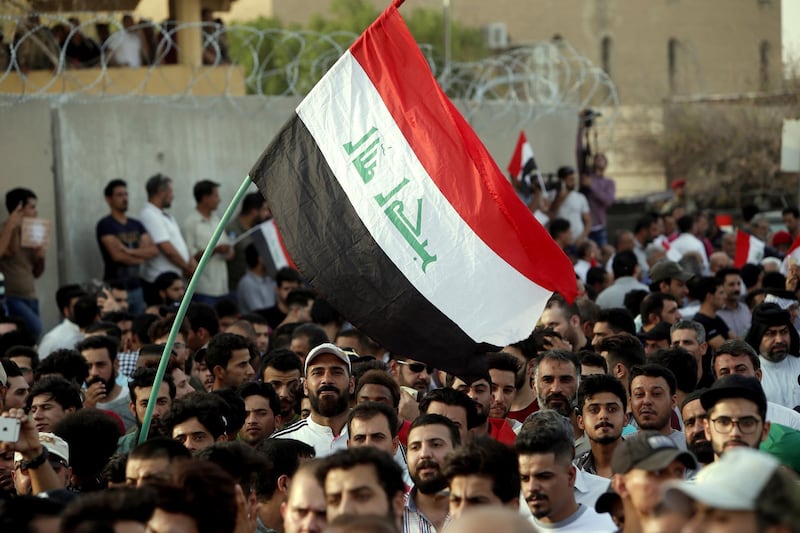Iraqi politicians have shown support for widespread protests against corruption and poor public services as demonstrators clashed again with security forces in Basra on Tuesday.
The country – without a new government since the May 12 elections – has been rocked by deadly rallies that erupted three weeks ago. On Tuesday thousands again demanded action over a lack of basic services and jobs.
"Iraqi security forces began to disperse demonstrators in front of Basra's provincial council by using force against the protesters to remove their tents and to stop them from camping outside," Ahmed Ali, a demonstrator, said on Twitter.
While security forces have clamped down when protests grew violent, Iraqi politicians have been forced to acknowledge that demonstrators have legitimate grievances.
Parliamentary spokesman Abdel Malik Al Husseini said the public has a democratic right to call for public services and the government must take full responsibility to ensure services, such as water and electricity, are provided.
"The caretaker parliament has been fighting for the rights of citizens by requesting to question and investigate alleged corrupt politicians, however, we have had no support and our requests have been rejected by the government," Mr Al Husseini told The National.
He said parliament should have been able to respond to public needs.
Most Iraqi politicians have also paid lip service to the protesters' demands. “We know that 65 per cent of the country’s lawmakers have shown sympathy towards the protest movements,” said Renad Mansour, senior research fellow at Chatham House.
_____________
Read more
Abadi sacks Iraq's electricity minister after protests
Iraq says Saudi to sell power at a fraction of Iran's price
Iraqi farmers fight to save cattle as drought tightens its grip
_____________
Last week, Iraq’s top Shiite cleric, Grand Ayatollah Ali Al Sistani, expressed solidarity with protesters, saying they faced an “extreme lack of public services” such as electricity in the suffocating summer heat.
“We can only stand with our dear citizens in their demands as we feel their great suffering,” Mr Al Sistani said through an aide during a televised Friday sermon.
Since the 2003 US-led invasion, Iraqi households have lived with unclean tap water, irregular electricity and ancient sewerage systems. The situation is particularly acute in Basra, which while a hub for oil exports that account for more than 95 per cent of Baghdad's central government revenue, is also riven with poverty and unemployment.
Populist cleric Moqtada Al Sadr was the surprise election performance in a May election which saw long-time political figures pushed out by voters seeking change in a country mired in conflict and corruption.
Mr Al Sadr has expressed sympathy for the demands of the protests, but finds himself in a complicated position.
“In the past he [Moqtada Al Sadr] would have been able to take over the protest movement and become the leader but because he’s in the middle of a government formation, he hasn’t been able to protest or tell his followers to go protest,” Mr Mansour said.
The cleric is going to find out what it’s like "when you’re in government and you’re unable to deliver the same services that protesters have, for many years, been calling for," Mr Mansour said.
The populist cleric's bloc, which was previously the primary protest organiser in the country, will be at the core of the incoming government. But if he finds the rigours of governance too challenging, he may be tempted to revert to rabble-rousing.
"Moqtada wants to put the protesters’ demands at the center of a new government, especially anti-corruption and skilled ministers," said Michael Knights, a senior fellow at the Washington Institute for Near East Policy.
"He will work on enforcing these conditions on the formation of the next government, and if the other political parties disappoint, he’ll leave the government and bring a million protesters to Baghdad, as he has before." .
The protests, which started in Basra have swept across southern Iraq, including the provinces of Maysan, Karbala, Najaf, Babil, Wassit, Diwaniya and Dhi Qar.
On Sunday, Prime Minister Haider Al Abadi sacked the electricity minister, Qassem Al Fahdawi, due to "poor performance of the sector".
Mr Al Abadi's office said the premier sacked Mr Al Fahdawi – whose departure was demanded by protesters — "because of the deterioration in the electricity sector."
Public protests, especially during the summer, have become the norm in recent years, especially as Iraqis are increasingly frustrated by the government’s inability to deliver services.
Sarhang Hamasaeed, director of Middle East programems at the US Institute of Peace, said: “Ultimately, these protests demonstrate Iraq’s fragility and an accumulation of public grievances that could lead to the rise of new extremist violence if not addressed.”






